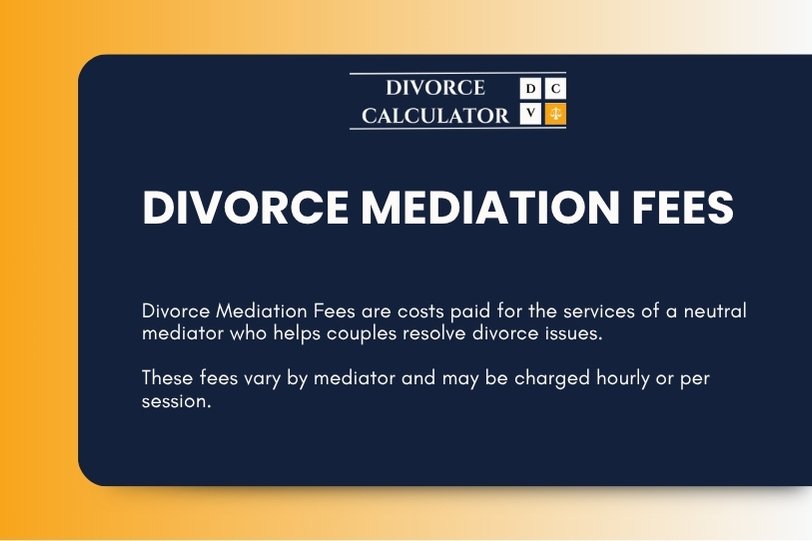When we begin navigating divorce, understanding the costs is often one of our main concerns. Divorce mediation fees are typically lower than litigation costs, but can still vary based on the mediator’s experience, session length, and geographic location. Before committing to the process, it’s crucial that we know what to expect and how different fees are structured.
Many of us may feel overwhelmed by the potential expenses involved. By exploring what goes into divorce mediation fees and how they are billed, we can make more informed decisions about our path forward.
Let’s discuss the typical price ranges, payment structures, and what we’re actually paying for in the mediation process. This clarity helps us weigh our options and confidently approach a challenging transition.
Key Takeaways
When we look at divorce mediation fees, we find that costs usually depend on location, mediator experience, and session length.
On average, mediation sessions cost between $100 and $300 per hour, but experienced mediators in high-cost cities may charge more. We often see total mediation costs ranging from $1,000 to $5,000 for a complete process.
Unlike litigation, mediation fees are generally split between both parties. It is important for us to clarify all costs upfront to avoid surprises later.
| Fee Type | Typical Range | Notes |
|---|---|---|
| Hourly Rate | $100 – $300+ | Varies by region and credentials |
| Per Session Fee | $300 – $1,000+ | For 2-4 hours per session |
| Flat Fee Packages | $1,000 – $5,000 | Covers multiple sessions & filing |
| Administrative Fees | $50 – $300 | One-time or per session |
We need to review service agreements carefully. Some mediators charge administrative or document preparation fees that are not included in session rates.
Fee structures can be hourly, per session, or flat rate. We should confirm how charges are billed and what services are covered.
It’s useful for us to ask about extra costs, sliding scales, and payment options before we proceed with mediation. This helps us budget more effectively.

Why It Matters In Divorce
Understanding divorce mediation fees is essential for us as we evaluate our options. These costs directly affect our financial planning during a challenging period.
By knowing the typical fees and structures, we can make informed decisions about whether mediation is right for us. Mediation costs are usually shared, which can help reduce disputes over payment.
Comparing mediation fees to traditional litigation, we often find that mediation is less expensive. Below is a simple comparison:
| Process | Typical Cost | Time Involved |
|---|---|---|
| Mediation | $3,000-$7,000 | Weeks/Months |
| Litigation | $10,000-$50,000 | Months/Years |
When we have a clear sense of the fees, we can budget more accurately. This allows us to avoid sudden financial surprises later.
Transparent mediation fee structures can also reduce misunderstanding or mistrust between both parties. Knowing the overall cost encourages open discussions and realistic expectations.
Finally, fee awareness helps us weigh the benefits of mediation against other legal options. It equips us with the facts needed to choose the approach that best fits our needs.
Real-Life Examples
To illustrate how divorce mediation fees work, let’s look at three examples from different regions and financial situations.
Example 1:
In a small Midwestern city, a couple used mediation for four two-hour sessions at $200 per hour.
Total fee: $1,600.
Example 2:
A couple in a high cost-of-living area in California selected a mediator charging $400 per hour.
They attended three three-hour sessions.
Total fee: $3,600.
Example 3:
Some couples may find sliding scale mediators based on income.
Below is a simplified table for a mediator with this policy:
| Household Income | Hourly Rate | Sessions (2 hrs each) | Total Estimated Fee |
|---|---|---|---|
| Under $50,000 | $100 | 5 | $1,000 |
| $50,000-$100,000 | $200 | 5 | $2,000 |
| Over $100,000 | $350 | 5 | $3,500 |
These examples reflect how geographic location, number of sessions, and mediator fee structures can influence costs.
Some mediation services charge a flat fee, such as $2,000 for up to five sessions. Others bill hourly and require a retainer upfront.
By considering these real-life scenarios, we see there are several possible pricing structures available. Many providers explain costs up front to help us plan ahead.
How States Handle Divorce Mediation Fees
State laws and court procedures play a significant role in determining who pays for divorce mediation and how much it costs. Fee structures and potential financial assistance programs can vary, so it is important to know what to expect depending on our location.
New York
In New York, mediation fees are generally paid by the parties involved, and costs can range from $100 to $500 per session. Most mediators charge per hour, though some may offer flat-rate packages for simpler cases. Court-ordered mediation through family courts may be available at lower or even no cost for those who qualify financially.
We may find sliding scale fee arrangements with nonprofits in New York City and some upstate counties. If we seek private mediators, costs are rarely subsidized. Legal Aid and certain court programs sometimes cover part or all fees for low-income families.
Many counties also require that both parties share costs equally unless they agree to a different arrangement. Payment rules and availability of free services vary depending on the county, so verifying with our local court or mediation center is advised.
California
California divorce mediation fees are not standardized, but most private mediators charge between $150 and $500 an hour. Fees are usually split between the parties, unless we reach an alternate agreement. County courts often provide mandatory orientation sessions at no charge before paid mediation is required.
If we qualify under income guidelines, some counties, such as Los Angeles and San Diego, offer low-cost or no-cost mediation through court services or public agencies. Table: Common Mediation Fee Structures in California
| Service Type | Typical Cost per Hour | Fee Split |
|---|---|---|
| Private Mediator | $200–$500 | Shared |
| Court-Connected | Free–$150 | Shared/Reduced |
| Community Agencies | Sliding Scale | Shared/Reduced |
Mediators may require an upfront retainer, and cancellation fees are common. We should check local court websites for current information on subsidies and income qualifications.
Texas
In Texas, divorce mediation is frequently court-ordered, with both parties generally responsible for splitting the mediation fee. The average rate for a private mediator is about $100 to $250 per hour, though full-day flat fees between $500 and $1,000 are common for more complex cases.
Most counties have Dispute Resolution Centers (DRCs) offering mediation on a sliding fee scale, and some provide free services if we meet certain income requirements. If the court assigns mediation, fees and payment splits are typically outlined in the court order.
We may also negotiate who pays what, especially when there’s a financial disparity between spouses. Each county DRC maintains specific fee schedules, so we should confirm pricing directly.
Florida
Florida courts often require mediation before trial and set standard fees for court-connected services. For cases not involving children, court mediation fees are commonly $60 per person per session for income-qualified parties. For families above set income thresholds, mediation can cost $120 per person or more, but private mediators usually charge $200 to $400 per hour.
We can apply for fee reductions or waivers if we qualify based on household income. Some counties have a list of certified mediators and detailed calculators to estimate costs. Key points:
- Statewide fee limits apply to court-ordered sessions.
- Private mediation is generally more expensive than court-connected mediation.
- Fee splitting is the norm unless otherwise negotiated or ordered.
It is possible to request that the court require the other party to pay more if there’s a significant financial imbalance. Each judicial circuit can have unique rules, so checking with our local court is essential.
Tips If You’re Dealing With Divorce Mediation Fees
When facing divorce mediation fees, we should first request a clear fee structure from our mediator. Knowing whether the charges are hourly, per session, or fixed helps us plan our finances more accurately.
Let’s always confirm if there are any extra costs, such as administrative or document fees. Having this information before starting can prevent surprise expenses.
We can ask about payment options, such as paying in installments or by credit card. Some mediators may offer sliding scale fees based on our income.
Here’s a quick way to compare mediators:
| Mediator | Hourly Rate | Fixed Fee Option | Sliding Scale Available |
|---|---|---|---|
| Mediator A | $200 | No | Yes |
| Mediator B | $175 | Yes | No |
| Mediator C | $225 | No | No |
We should look for mediators who offer free or low-cost initial consultations. This helps us gauge costs without commitment.
It’s important to keep all fee agreements in writing. This way, if disputes arise, we have clear documentation of what’s been promised.
If we think fees might become a problem, we can try to limit mediation sessions to specific topics or issues. Focusing our discussions often keeps costs down.
Frequently Asked Questions
Divorce mediation fees vary depending on the type of mediation, the location, and the experience of the mediator. Specific factors influence both the structure and the total amount paid for these services.
What is the typical cost range for divorce mediation services?
We typically see mediation services cost between $100 and $500 per hour. Some mediators offer package deals for full-service mediation, with total fees ranging from $2,000 to $5,000 for a complete divorce case.
How are fees structured for child custody mediation?
Child custody mediation is usually billed hourly, with rates similar to general divorce mediation—around $100 to $400 per hour. Some court systems provide limited sessions at low or no cost, while private mediators may charge for each session or require advance payment for a block of hours.
In which circumstances is divorce mediation generally not advised?
We find that mediation is not appropriate when one or both parties feel threatened, in cases involving domestic violence, or when there is a significant power imbalance. Mediation might also be ill-advised if either party is unwilling to disclose finances or refuses to negotiate in good faith.
Are the costs associated with divorce mediation typically less than litigation?
Mediation almost always costs less than litigation due to lower attorney fees and reduced court expenses. For example, litigated divorces can easily reach $10,000 to $30,000 or more, while mediation is often a fraction of that amount.
Can the cost of divorce mediation vary by state, and what are some examples?
Yes, the cost varies significantly by state. In California, private mediation may cost $250 to $500 per hour, while in Texas, rates can be lower, ranging from $100 to $350 per hour or session. Local demand and cost of living impact these price differences.
What factors influence the hourly rate of a private mediator for divorce proceedings?
A mediator’s experience, location, credentials, and case complexity all influence hourly rates. More experienced mediators or those with specialized legal backgrounds often charge higher fees, and urban areas generally have higher rates than rural areas.



